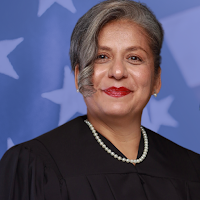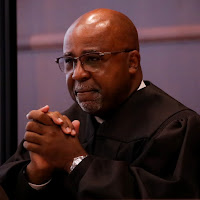A number of readers have alerted me to a February 3 Memorandum Opinion and Order by Judge Patrick T. Stanton in the case of
DiFranco v. Fallon, et al., 2020 COEL 000032. Here is a
link to the decision; you can read the entire thing yourself. There has also been coverage in the
Law Bulletin (although I can't link to that... my subscription was a Covid casualty).
Nearly every judicial race in Cook County was uncontested in November 2020. There were only
two, in fact, where voters could choose between a Democratic and Republican candidates, one in the 12th Subcircuit, and the other in the 13th.
On Election Night, it looked like there might be a split decision: Although both Republican candidates were leading in
early returns, the margin in the 13th was razor-thin. By 9:43 p.m.,
when I checked in again on these races, Democrat Susanne Michelle Groebner had taken a narrow lead in 13, but, with 229 of 241 precincts reported, 12th Subcircuit Republican candidate Frank DiFranco's margin had substantially increased, to 9,553 votes.
If 2020 had been an ordinary election, with the numbers reported, DiFranco would have been pretty well assured of victory. One can hardly blame DiFranco or his supporters for thinking, on Election Night, that he had won.
But 2020 was
not an ordinary election. It was a Covid election, and, in the 12th Subcircuit, as indeed across the country as a whole, the major political parties had employed wildly different get out the vote strategies.
(Why not? They don't agree on anything else either.)
The Republican strategy was traditional, the global pandemic notwithstanding: Get its supporters to the polls on Election Day. The Democrats, however, took advantage of new laws passed for the 2020 election, encouraging their potential supporters, who might have been skittish about showing up in person on Election Day, to instead vote by mail.
Pundits -- for once -- made an accurate prediction: The national electoral map would look surprisingly red on Election Night, but the colors would change as the VBM ballots were tallied. (They made this prediction -- and then, on Election Night, promptly forgot it, losing their dang minds on live TV when it looked like Trump might pull out a second term.)
There were a
lot of VBM ballots in Cook County's 12th Subcircuit. And these ultimately proved decisive.
But it took awhile.
On November 12,
when I looked at the race again, DiFranco was still ahead, but his margin had declined precipitously, from 9,500 to 2,500:
By November 16,
DiFranco's was clinging to a 485-vote lead.
By November 24, when the
final results were made known, appointed Judge Patricia M. Fallon had eked out a narrow win over DiFranco, by 502 votes, 82,976 to 82,474.
I have run for judge twice and I know how terrible it feels to lose. How devastating.
But I had the decided advantage -- or so it would now appear -- of being trounced. Rejected. Destroyed. In crowded fields both times I finished dead last.
I have a hard time imagining how much worse it would be to come so close -- to in fact be seemingly far ahead, only to see that lead melt away and, ultimately, vanish. I thank heaven that my imagination is insufficient to the task; what I can imagine is bad enough, thank you.
None of this is meant to excuse or justify the conduct that Judge Stanton found so egregious in the February 3 order linked above. It does, perhaps, explain that conduct, at least a little. If you try and put yourself in DiFranco's shoes, you can perhaps better understand why things have proceeded to this point. He
spent nearly $700,000 on the campaign alone (and certainly much more besides in the aftermath). It must be tremendously hard to let this go.
However, in expressing some empathy for how Mr. DiFranco must feel, I do not mean to deny or diminish the different, but still real, anguish that Judge Fallon must be experiencing as this post-election litigation drags on. I have never actually won a judicial election (obviously) but I have been involved in litigation that dragged on for seemingly forever, long past the point where the likely outcome should have become clear to the other side. I can empathize with Judge Fallon here, too.
Unfortuntately, there is no happy medium that can be found in this case. No compromise. No shared custody of the gavel, or visitation in the courtroom on alternate weeks.
The end must come soon.
Even if we assume the best, if we assume that the unmasking of 22,000 redacted signatures on the County Clerk's summary judgment exhibit/thumbdrive (without at least first telling the court and the other parties about this) was not unethical but merely unwise, so that no one is actually looking down the barrel of an ARDC beef, the end result is still the same. The odds of success in the trial court, which were never much to begin with (just considering the history of Illinois election challenges generally), have diminished still further, and considerably so. I seem to recall learning somewhere that it is never a good idea to employ a tactic that the alienates the trial court. (Actually, this is another area in which I have, unfortunately, first-hand experience.) If nothing else, Judge Stanton's order makes clear that he is not pleased with the litigation tactics of Mr. DiFranco's counsel.
Were mistakes made in the vote count?
Undoubtedly.
There is no human enterprise, espcially one this complex, that is free from human error. Only God is perfect.
Were there more than 502 votes counted for Judge Fallon that should not have been counted?
Perhaps there were.
But it would be the height of folly to admit that possibility and then deny that Mr. DiFranco also likely received credit for votes that were improperly tallied.
DiFranco got thousands of mail-in votes too. It's just that he got only two (roughly) for every three that Fallon got.
I suspect -- mind you, I suspect but do not accuse -- that at least some of the people who contacted me about this recent decision were rejoicing, just a bit, in DiFranco's downfall. I understand that impulse, too. A lot of people worked very hard for Judge Fallon and they are pleased, to put it mildly, at this latest vindication.
But that is not what is called for here and now. What is needed now is an end to this, giving
all parties the opportunity to recover their dignity and move on.
And, as long as I am giving unsolicited advice, let me say that there is a much bigger problem with VBM than this one suburban judicial race.
Extensive voting by mail -- so that meaningful, potentially result-changing returns trickle in for a week or more after the polls close -- is a really bad idea.
I understand and sympathize with the idea that voting should be made as easy as possible for as many as possible. But the advantage of VBM is outweighed and overcome by the interjection of doubt and uncertainty that VBM adds to our election process. We already have far too many people -- including a great many who should know better -- who are all too willing to cast doubt in advance on the integrity of our electoral process (if it looks like their candidate might be behind in the polls). In the last national election, where the results were close in several swing states, partisans on both sides impugned the election system repeatedly, up to and beyond Election Day, the better to support a possible claim that their candidate, who might lose, actually won. And then the party that actually lost did in fact follow through with unfounded claims that it won.
VBM isn't worth it. No one election contest -- no one election cycle -- is worth risking a loss in the faith and trust and confidence of the American people in their institutions.
In 2022 there will be VBM. The wise candidates will figure out how to maximize their turnout among these voters, too. But we will all be better off if we eliminate, or at least greatly restrict, this potential source of post-election mischief. *
Steps down from soapbox.*
 A number of readers called this to my attention. This is from Facebook:
A number of readers called this to my attention. This is from Facebook:



















